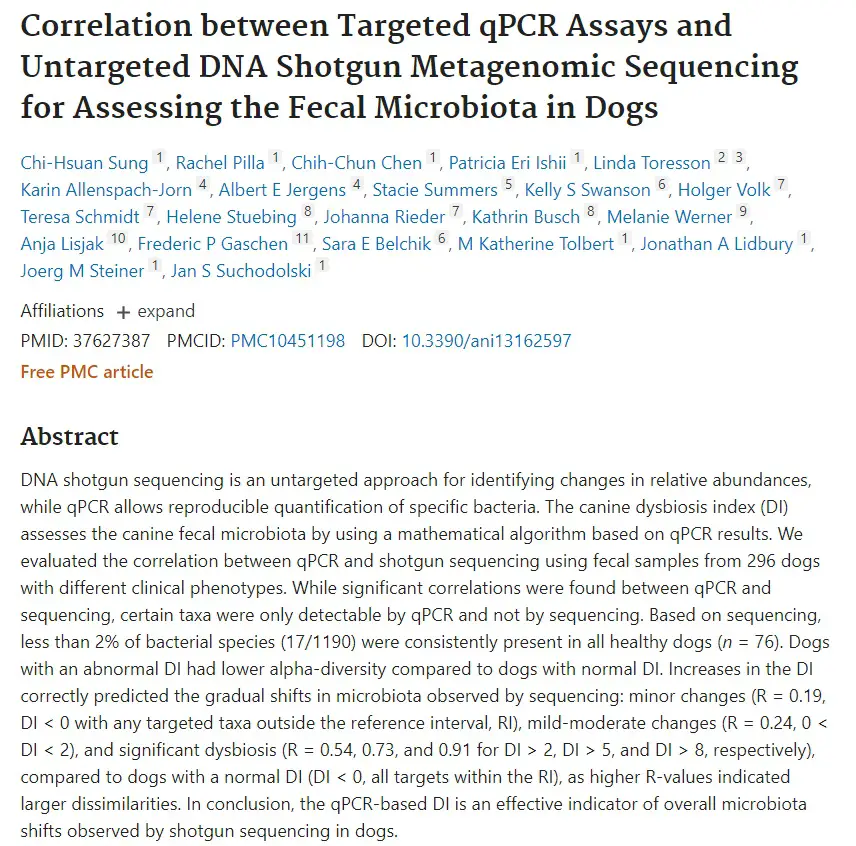The graphic I found to modify for this post alone is worth the trouble. Cracks me up. Let's face it tummy problems in dogs are NO fun -- for them or us. So, it's pretty interesting that researchers at Texas A&M developed and validated a new diagnostic index that uses changes in a dog's microbiome to figure out if something is acute or chronic ... and eventually help find better treatments. I even answer the question, "How Does This Help Your Dog's Tummy Problems?"
I'm not going to go too deep into the published study (like I usually do) because microbiome / DNA stuff is so complicated. Still, these few key points should give you good baseline info for your dog's future veterinary care needs.
Tummy Problems in Dogs & Dysbiosis
Basically dysbiosis means that the gastrointestinal microbiome in dog gets out of balance, typically due a loss of beneficial bacteria in the gut.
The study looked at the microbiome of 296 dogs and showed how the new GI index helps veterinarians tell the difference between tummy problems in dogs:
- Acute issues
- Chronic GI disfunction
- Non-GI disorders
Researchers tracked developed what diagnostic labs call reference intervals. These intervals kind of set limits for normal, not normal, and what's important or not when it comes to tummy problems in dogs.
About the Dogs in This Study
The researchers explain: "This study included fecal samples from 296 dogs with diverse clinical phenotypes, sourced from previous studies. The study population consisted of:
- 78 clinically healthy control dogs
- 146 dogs with chronic enteropathy (CE)
- 35 dogs with diseases unrelated to the gastrointestinal tract (22 dogs with neurological signs and 13 dogs with non-GI neoplasia)
- 20 dogs on antibiotics
- 17 dogs with acute diarrhea (AD)."
Key Points from Tummy Problems in Dogs Study
Here are a few key points / quotes from the published paper.
"...dogs with significant dysbiosis had a microbiota shift far away from dogs with a normal DI, indicating a marked difference in the overall microbiota composition."
"The DI model ultimately consisted of seven bacterial groups that provided the balance between highest classification accuracy and the lowest number of assays. The DI’s ability to capture the overall shifts in the fecal microbiota is further supported based on the results of the current study."
"Consistent abnormal DI values may indicate an imbalance in the gut microbiota and reflect more severe abnormalities within the gastrointestinal tract."
"Notably, not all dogs with CE in our study population exhibited shifts in sequencing and DI. Approximately 36% of dogs with CE had a normal DI in this study, consistent with findings from other studies..."
Study Conclusion
The paper says, "... The qPCR-based canine dysbiosis index accurately predicted shifts in the microbiome observed on shotgun metagenomic sequencing. It is important to note that targeted assays, such as qPCR, have limitations as they only detect a pre-defined set of microbial targets. Nonetheless, this study provided evidence for the use of the DI as an effective indicator of shifts in the fecal microbiota in dogs, which allows better comparisons across studies and individual dogs over time due to superior reproducibility and analytical sensitivity. Combining the strengths of both approaches can enhance our understanding of the gut microbiome and its role in health and disease."
How Does This Help Your Dog's Tummy Problems?
Well, it's a start toward something, I think. And, the GI Index test got licensed to both Texas A&M and Idexx Laboratories, so your veterinarian could order these tests and see how it helps understand and treat your own dog's tummy troubles.




I recently had Quinn’s microbiome checked using this test which revealed a balanced microbiome. Previous to this I used AnimalBiome test and was able to use AB’s fecal capsules to help balance Quinn’s microbiome. A win win for me.
That is so good to know, Karen. I’m glad it has worked out ok for your Quinn.